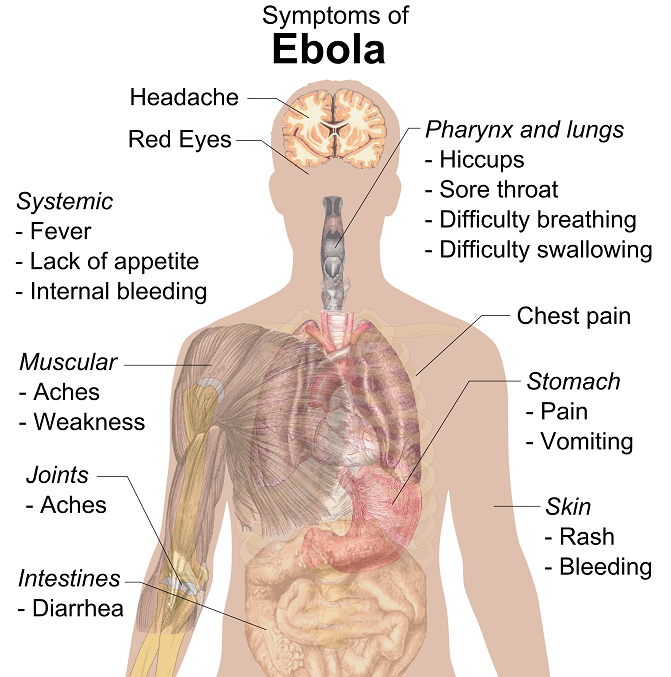
md-health.com

Vanderbilt.edu
..........
| October 09 2015 11:50 AM | Biological Hazard | Nigeria | State of Cross River, Calabar |
RSOE EDIS Event Report
Biological Hazard in Nigeria on Friday, 09 October, 2015 at 11:50 (11:50 AM) UTC.| Description | |
| The Accident and Emergency ward of the University of Calabar Teaching Hospital (UCTH) has been shut following the death of a patient with Ebola-like symptoms. Besides, 10 people have been quarantined in Calabar, the National Emergency Management Agency (NEMA) tweeted yesterday. The Federal Government has dispatched a team to Calabar to ascertain the Ebola scare in the Cross River State capital. The federal and the Cross River State government have dismissed the Ebola link to the case. According to the Director of the National Centre for Disease control (NCDC) Prof. Abdulsalam Nasidi, the government is awaiting the result of the laboratory investigation but it believed the patient died of hemorrhagic fever. Nasidi also assured Nigerians that there was nothing to fear as measures have been taken to protect the people and including those who might have had contact with the patient The state government said it was awaiting results of blood samples of the patient, who died with symptoms of viral haemorrhagic fever. Dr Sunday Omini, Director of Public Health in the state Ministry of Health, said: "We are aware of the situation and we have got preliminary reports from the hospital, and we are all awaiting the result of the blood samples. "But, judging from the information I have received so far, I am 90 per cent sure that it is not Ebola. "'However, we are on top of the situation; there is no cause for alarm,'' he said. The management of UCTH said it had informed the NCDC, the Federal Ministry of Health and the state government about the development. A statement by Dr Queenet Kalu, Chairman, Medical Advisory Committee (CMAG), on behalf of the Medical Director of the hospital, said the public would be informed as soon as results of the blood samples are released, adding that the hospital management had quarantined those identified to have had contacts with the patient. "Further information will be made available as soon as we receive the results of the samples sent for analysis,'' the statement said. Nigeria had its first dose of Ebola disease on July 20, 2014 when Liberian Patrick Sawyer, sneaked into the country after been afflicted with the deadly disease. But the country's medical team rose up to the occasion to curtail its spread with minimal casualty. | |
| Biohazard name: | Ebola-like symptoms death |
| Biohazard level: | 4/4 Hazardous |
| Biohazard desc.: | Viruses and bacteria that cause severe to fatal disease in humans, and for which vaccines or other treatments are not available, such as Bolivian and Argentine hemorrhagic fevers, H5N1(bird flu), Dengue hemorrhagic fever, Marburg virus, Ebola virus, hantaviruses, Lassa fever, Crimean-Congo hemorrhagic fever, and other hemorrhagic or unidentified diseases. When dealing with biological hazards at this level the use of a Hazmat suit and a self-contained oxygen supply is mandatory. The entrance and exit of a Level Four biolab will contain multiple showers, a vacuum room, an ultraviolet light room, autonomous detection system, and other safety precautions designed to destroy all traces of the biohazard. Multiple airlocks are employed and are electronically secured to prevent both doors opening at the same time. All air and water service going to and coming from a Biosafety Level 4 (P4) lab will undergo similar decontamination procedures to eliminate the possibility of an accidental release. |
| Symptoms: | |
| Status: | suspected |

No comments:
Post a Comment
Hello and thank you for visiting my blog. Please share your thoughts and leave a comment :)